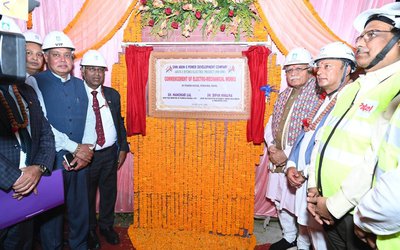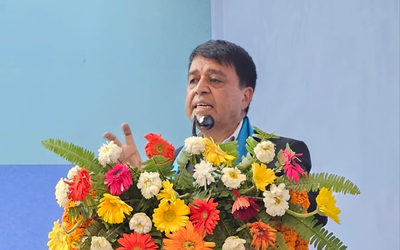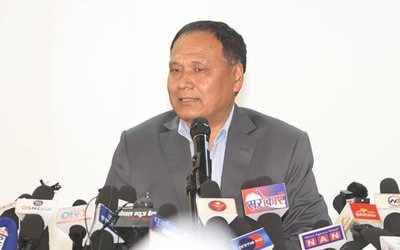
Although various commercial and development banks are in the process of merger, NIC-ASIA Bank has emerged as the first bank to commence its operation after completing its merger as per the schedule proposed by both the banks.
The message of the bank is clear -- if there is a will, there is a way. Although there are several individuals who worked hard to make the merger process possible, including board member Rajendra Aryal, NIC bank's Chief Executive Officer Sashin Johi has played a key role in settling the issues during the course of the merger.
Amidst a function, Governor of Nepal Rastra Bank Dr. Yuba Raj Khatiwada inaugurated the NIC ASIA Bank's new corporate office at Trade Tower. After the completion of the merger of NIC Bank and Bank of Asian Nepal (BOAN), NIC ASIA Bank commenced its operation on June 30, 2013. With the merger, NIC-Asia Bank turns into one of the largest commercial banks of Nepal.
“Merger is not easy. One must realize that a bank is not like a cement factory or other establishment and the merger should not be taken as a way to evade taxes or other such things," said Governor Dr. Khaitwada, inaugurating the corporate office. "The bank has more responsibilities now as this is the first bank commencing the operation after the merger."
According to a press release issued by the Bank, this merger was initiated with the signing of a Memorandum of Understanding on 28th June 2012 followed by an in-principle approval given by NRB on 23rd July,2012 and a Merger Agreement on 31st Jan 2013; with the final approval given by NRB on 26th April 2013.This merger has created a history in the Nepalese banking sector as the first merger of two “A” class commercial banks. With this merger, NIC ASIA Bank is now amongst the largest private sector commercial banks in the country in terms of capital base, balance-sheet size, branch/ATM network, customer base and employees.
Speaking at the function, Jagdish Prasad Agrawal, chairman of the bank, expressed his commitment that the bank will provide efficient and professional services. "I am very happy to say that Nepal Rastra Bank has supported us from the very beginning till now making the merger process a success. We still need NRB's support in the coming days also."
Before the merger, NIC Bank had 36 branches and BOAN 29 branches. With the consolidation of 13 branches and addition of a Corporate Branch, NIC Asia Bank now have 53 branches and 57 ATMs which will be expanded to a total of 66 branches within 1 year with the re-location of the 13 branches. The Bank has a customer base of 270,000 and a strong capital base of close to NPR 5 billion, including retained earnings for the current year.
The bank's consolidated Operating Profit for the first 11 months of the current year to mid-June 2013 is NPR 1.43 billion. On a consolidated basis, the bank's deposit base now is NPR 38 billion with loans & advances of Rs 33 billion.
"The process of merger was very difficult. The merger was possible because of support given by all concerned stake holders," said Rajendra Aryal, member of the bank.
NIC Asia Bank has a new Board of 9 members chaired by Jagdish Prasad Agrawal. Other members of the Board are Trilok Chand Agrawal, Tulsi Ram Agrawal, Lokmanya Golchha, Ramchandra Sanghai, Rajendra Aryal (Public), Birendra Kumar Sanghai (Public), Binod Kumar Pyakurel (Public)and Independent Professional.
The Management will continue to be headed by Sashin Joshi as Chief Executive Officer supported by senior executives of both banks. "Nepal Rastra Bank has been very supportive to us from the very beginning. The merger was impossible without support of NRB," said Chief Executive officer Sashin Joshi.
Despite the merger and consolidation of a large number of branches, there will be no staff retrenchment as the Bank believes that it has very qualified, trained and competent people who can add value and contribute to the Bank's growth plans after the merger.
Share trading, which has been stopped since the signing of the MOU, will be now resumed immediately on receipt of NRB approval expected soon. BOAN shareholders will be issued new share certificates equivalent to 1 share of NIC Asia Bank for 2 shares of BOAN. Existing share certificates of NIC Bank shareholders will continue to be valid.
- TEACHERS ON STRIKE: Students' Future In Jeopardy
- Apr 25, 2025
- NEPAL-THAILAND: Joint Business Council
- Apr 13, 2025
- BIMSTEC SUMMIT: Nepal’s Stand
- Apr 11, 2025
- IME GROUP: Expands Into Paper Industry
- Mar 24, 2025
- CPN UML: Instigated By India
- Mar 23, 2025















